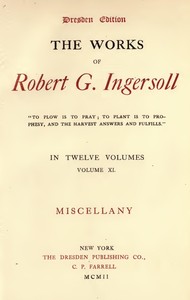The Works of Robert G. Ingersoll, Vol. 11 (of 12) by Robert Green Ingersoll
"The Works of Robert G. Ingersoll, Vol. 11 (of 12)" by Robert Green Ingersoll is a collection of speeches and writings from the late 19th century. This volume, titled "Miscellany," predominantly focuses on topics of civil rights, religion, and moral philosophy, capturing Ingersoll's critical viewpoints on societal norms and the legal framework of his time. Ingersoll, a renowned orator and political activist, tackles the intricacies of the Civil Rights Act, the role
of the Supreme Court, and the implications of systemic prejudice. At the start of the volume, the opening portion presents an address delivered by Ingersoll on the Civil Rights Act of 1875, following the Supreme Court's ruling that deemed it unconstitutional. He critically analyzes the decision, asserting that it perpetuates racial discrimination and starkly opposes the intended spirit of the 13th and 14th Amendments, which were meant to safeguard the rights of all citizens regardless of race. Ingersoll emphasizes the necessity of federal protection against state-sanctioned discrimination and reframes the legal discussion to focus on equality and justice, showcasing his belief in the imperative of civil rights in America. This commentary sets the tone for a compelling discourse on social justice and the evolving understanding of citizenship in the United States. (This is an automatically generated summary.)
Read or download for free
| How to read | Url | Size | |||
|---|---|---|---|---|---|
| Read now! | https://www.gutenberg.org/ebooks/38811.html.images | 1.1 MB | |||
| EPUB3 (E-readers incl. Send-to-Kindle) | https://www.gutenberg.org/ebooks/38811.epub3.images | 511 kB | |||
| EPUB (older E-readers) | https://www.gutenberg.org/ebooks/38811.epub.images | 529 kB | |||
| EPUB (no images, older E-readers) | https://www.gutenberg.org/ebooks/38811.epub.noimages | 448 kB | |||
| Kindle | https://www.gutenberg.org/ebooks/38811.kf8.images | 783 kB | |||
| older Kindles | https://www.gutenberg.org/ebooks/38811.kindle.images | 732 kB | |||
| Plain Text UTF-8 | https://www.gutenberg.org/ebooks/38811.txt.utf-8 | 950 kB | |||
| Download HTML (zip) | https://www.gutenberg.org/cache/epub/38811/pg38811-h.zip | 485 kB | |||
| There may be more files related to this item. | |||||
Similar Books
About this eBook
| Author | Ingersoll, Robert Green, 1833-1899 |
|---|---|
| Title |
The Works of Robert G. Ingersoll, Vol. 11 (of 12) Dresden Edition—Miscellany |
| Contents | Address on the Civil Rights Act -- Trial of C. B. Reynolds for blasphemy -- God in the Constitution -- A reply to Bishop Spalding -- Crimes against criminals -- A wooden god -- Some interrogation points -- Art and morality -- The divided household of faith -- Why am I an agnostic? -- Huxley and agnosticism -- Ernest Renan -- Tolstoï and "The Kreutzer Sonata." -- Thomas Paine -- The three philanthropists -- Should the Chinese be excluded? -- A word about education -- What I want for Christmas -- Fool friends -- Inspiration -- The truth of history -- How to edit a Liberal paper -- Secularism -- Criticism of "Robert Elsmere," "John Ward, Preacher," and "An African Farm" -- The libel laws -- Rev. Dr. Newton's sermon on a new religion -- An essay on Christmas -- Has Freethought a constructive side? -- The improved man -- Eight hours must come -- The Jews -- Crumbling creeds -- Our schools -- Vivisection -- The census enumerator's official catechism -- The agnostic Christmas -- Spirituality -- Sumter's gun -- What infidels have done -- Cruelty in the Elmira Reformatory -- Law's delay -- The bigotry of colleges -- A young man's chances to-day -- Science and sentiment -- Sowing and reaping -- Should infidels send their children to Sunday school? -- What would you substitute for the Bible as a moral guide? -- Governor Rollins' fast-day proclamation -- A look backward and a prophecy -- Political morality -- A few reasons for doubting the inspiration of the Bible. |
| Credits | Produced by David Widger |
| Reading Level | Reading ease score: 68.0 (8th & 9th grade). Neither easy nor difficult to read. |
| Language | English |
| LoC Class | BL: Philosophy, Psychology, Religion: Religion: General, Miscellaneous and Atheism |
| Subject | Free thought |
| Category | Text |
| EBook-No. | 38811 |
| Release Date | Feb 9, 2012 |
| Most Recently Updated | Nov 17, 2012 |
| Copyright Status | Public domain in the USA. |
| Downloads | 421 downloads in the last 30 days. |
| Project Gutenberg eBooks are always free! | |

